Reviews
Robert Downey Sr.
USA, 1972
Credits
Review by Steve Macfarlane
Posted on 11 April 2013
Source Scorpion Entertainment DVD
Categories Acid Westerns
If the classic Western takes place in the Southwest or in Mexico, then there might an entire subset of Westerns that seem to take place on another planet, inhabited solely by swaths of humanity doomed to forever ape classic Westerns. Whereas Ford, Hawks and even Peckinpah aimed to paint a familiar facsimile of American frontier history, Leone, Brass, and Castellari, et al., created a bizarro alternative version that was always more than a few miles out of range from verisimilitude - and often gleefully so. Greaser’s Palace sees an American filmmaker (Robert Downey Sr.) exploiting the inherent weirdnesses of the spaghetti western in full: the dislodged, overdubbed English, the listlessness of an open set smack in the middle of nowhere, the game-changing possibilities opened up by buckets of obviously fake blood. As a retelling of the Passion, the film ultimately flies more in the face of Hollywood - both as an institution and as a way of telling certain stories - than that of the church, although whatever controversy the film courted with its pugnacious sadism and despair is more than understandable.
From a massive elevated cabin in the New Mexico mountain range, Seaweedhead Greaser presides over a downtrodden fiefdom, attended to by a warts-and-all stock company of hangers-on, lowlives, stoic Indians and dirt-faced poor. Taking tolls from the locals one “thank you” at a time, Greaser seems thoroughly bored, and his saloon doubles as a kind of desert Apollo—a place for vagrant entertainers to try their luck with the local clientele. The whole thing is lorded over by his daughter Cholera, who opens the picture with a bluegrass torch burner advising the audience - all men, natch - that “the glory of your fatherhood is threatened near at hand,” and to “save your power for tomorrow.” Downey uses the song to introduce his coterie of horny miserables (most looking like they were plucked from the nearest frontier depot), with the village monk the most rapt.
When Greaser’s son, Lammy Homo, gets a cigar stubbed out on his chest, he falls to the floor screaming and writhing; Greaser’s men take him outside as soaring fiddles cover the ruptured revue. Greaser chuckles and forgives his son, then calls him back for a hug—then, pulls out two Winchesters and plugs him. It’s not unlike the killing of David Carradine’s moon-faced cowboy in McCabe & Mrs. Miller, but whereas Altman seized on that moment as a fork in the road, Downey’s most “shocking” moments are rendered pretty casually, every would-be turning point built instead into a different resolution that, the viewer can only assume, will come later. It’s soon revealed that the final aim of Greaser’s amateur hour setup is for the old baron to successfully take a shit, with his whooping attendees breathlessly following him to the outhouse only to come back angry and empty-handed.
If you hadn’t guessed, Greaser’s Palace is a smorgasbord of pent-up tensions and ideas, lacerating in its analogies for the entertainment industry (see above) but also given to a Freudian longing for the reconciliation of father and son—a reunion Downey ensures will go wrong every single time. A corpse slung over a donkey, Lammy Homo runs into Jessy, a zoot-suit-wearing messiah who literally drops out of the sky (via hot air balloon) and cures the dead youngster in seconds. Jessy explains: “I’m sorry I brought you back but I need your help.” When Lammy asks who he is, he repeats the phrase again, then explains further, “I’m on my way to Jerusalem, to be an actor-singer. It is written that the Agent Morris awaits me.” Downey makes no attempt to hide Arbus’ Yiddish-modulated New York accent; Lammy and Jessy set out to return to the Palace.
The son’s inability to stay dead gives another clue to the film’s attitude about showbiz and, indeed, it’s hard not to feel that this is a universe where the dead have it easiest. Despite the aforementioned quotes, language is a low priority to Downey’s vision, and the disproportionality of word to image make the picture hauntingly tone-deaf in ways that could only have spelt career suicide for the director. When Jessy walks on water, it’s a pantomime scene played utterly deadpan—without music, wisecracks or smash edits, letting the air out of itself well before the moment has finished. His butt swinging back and forth as he marches in a straight line across the prairie in an unimpeachably clean suit, Arbus’ Christ is weirdly prescient of, well, Barack Obama—his mellifluousness is matched only by its flatness, his lack of dramatic affect. He is a performer. But rather than a mere projection of ideals by his followers (which he accumulates over the course of coming into Greaser’s circle), Jessy actually cures the sick on his path to Jerusalem.
The question of how this anthill society will absorb his power is what gives the film its final narrative bent, although Downey litters the path with still more opaque clues and digressions (including but not limited to title designer Pablo Ferro as a silent Indian, Herve Villacheze as a horny midget who invites Jessy over for dinner, and a silent subplot concerning the murder and resurrection of a young man’s family, featuring Downey’s actual son and wife.) The controversy-courting preponderance of sex, squalor and murder is the film’s opening gambit; its real power lies in its subversion of, well, the norms of subversion. With an impossibly unwieldy amount of overt desert symbolism, Greaser’s Palace suffers—but it’s in keeping with Downey’s character that this is a deliberate meta-feint, an almost desperate thrashing against whatever literary criteria for connect-the-dots satire existed at the time. Its satire is existential, down to the very fibers of the film’s being.
When Jessy finally ascends the stage at the Palace, his first act - a tame bit of throwback piano-and-tap boogie woogie - is met with silence. But when he finds himself wracked by stigmata, spinning uncontrollably as blood seeps from his palms, wailing in agony, the crowd goes wild - Greaser accosts him. “It’s the greatest thing I’ve ever seen! Let’s talk!” The fallout from the act sees Jessy spurning Greaser but making it with Cholera, while Lammy Homo and his father slowdance to a mariachi band in yet another forced reunion. Greaser finally manages to take a shit and the palace explodes. Jessy’s crucifixion will come as a surprise to none. From start to finish, Downey has more or less drawn approval - paternal or otherwise - as an inevitable complement to a long and miserable death, filled with second acts.
More Acid Westerns
-
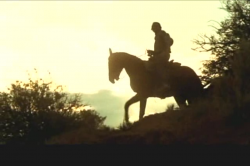
Ride in the Whirlwind
1965 -
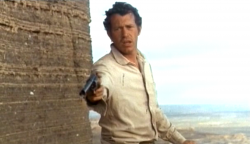
The Shooting
1966 -
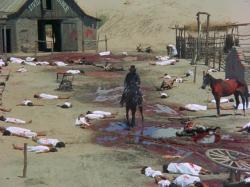
El Topo
1970 -
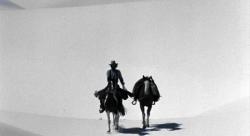
The Hired Hand
1971 -
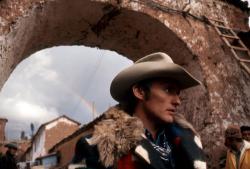
The Last Movie
1971 -
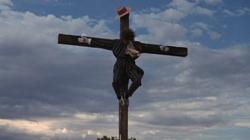
Greaser’s Palace
1972 -
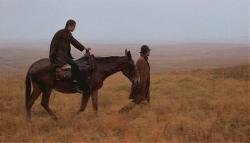
Bad Company
1972 -
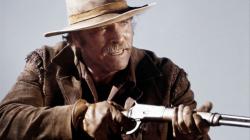
Ulzana’s Raid
1972 -
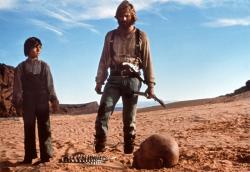
Jeremiah Johnson
1972 -

Pat Garrett & Billy the Kid
1973 -
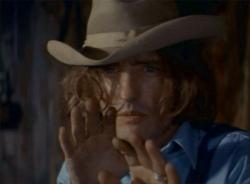
Kid Blue
1973 -

Dead Man
1995
We don’t do comments anymore, but you may contact us here or find us on Twitter or Facebook.



